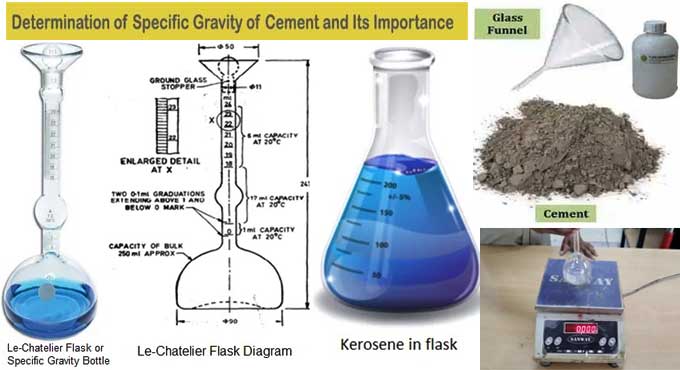NEWS | SOFTWARE | SHEET
A Discussion of the Importance of the Specific Gravity Cement Test for Concrete
The specific gravity of a material is typically defined as the ratio between its weight and that of water given a given volume. In terms of specific gravity, Portland cement is around 3.15. Portland Pozzolana cements and Portland blast furnace cements have closer values to 2.90. A non recent gas such as kerosene is used to determine the specific gravity of cement.
An important definition of Specific Gravity is the ratio of a substance's density to the density of a reference substance at a given temperature. Alternatively, it is the ratio of the mass of a substance to the mass of a reference substance. However, the volume should be the same in both states, regardless of their density or mass.
Cement is also included in the theme. The Specific Gravity of cement represents its density or mass in relation to a reference substance. When the volume changes, then the specific gravity ceases to exist. Substances or reference substances will change in mass or density.
Importance of Specific Gravity of Cement
The specific gravity of cement can increase or decrease depending on its moisture content. The cement particles contain pores or particles that can contain water.
Nominal mixes are prepared using cement with a specific gravity of 3.15. The mix design will be affected by any change in specific gravity value. As a result, the specific gravity of cement purchased before mixing.
Old stock cement is not used for this reason. Old stock cement can be affected by the moisture content of the environment. If the cement's specific gravity is greater than 3.19, it is either poorly ground or has high moisture content. When chunks of cement are present, moisture content is present.
Specific Gravity Cement Test Procedure
- It is necessary to allow the flask to dry completely and to be free of liquid and moisture. It is taken as W1 that the empty flask weighs.
- Around 50 grams of cement are filled into the bottle and sealed with a stopper. A stopper is used to weigh the arrangement & it is taken as W2.
- A bottle of kerosene is filled and the mixture is mixed thoroughly before air bubbles are removed. A flask filled with kerosene and cement with a stopper is weighed and taken as W3.
- Afterward, kerosene is poured into the flask until it reaches the top. W4 is taken as the weight of the arrangement.
Specific Gravity Calculation in any Substance
So, if we know the specific gravity of a substance, we can use the material for a suitable purpose. We can also know whether the material sinks or floats in water.
Bad Weather
In bad weather conditions, a cement surface may become covered with high levels of moisture, which may result in the specific gravity going up to 3.19. If the specific gravity reaches 3.19, the pores in cement are filled with moisture. It is due to the presence of excessive moisture that old cement contains so many lumps.
Water
Specific gravity determines how a substance behaves in water. Every substance in our environment has a fixed specific gravity. It usually ranges from 1 to 100.
The specific gravity describes how much heavier a substance is than water or a reference substance of the same volume. The specific gravity of cement ranges from 3.1 to 3.16 gram by cubic centimeter. Water will sink it if the specific gravity is greater than 1.
There is no sinking in water if the specific gravity is less than 1. As a result of this statement, we can determine that cement is 3.1 to 3.16 times heavier than water of the same volume. In water, it sinks because its specific gravity is greater than 1.
It is common for materials to contain voids because they contain so many pores.
Hydration
Materials become useless when they contain any voids. By reacting with atmospheric moisture, cause cement to undergo a chemical reaction.
To get more clear ideas, go through the following exclusive construction video tutorial.
Lecturer: Anime_Edu - Civil Engineering Videos
Hydration is the process by which water is absorbed into the cement. Cement is highly susceptible to moisture damage. As soon as cement is hydrated with water, it becomes useless.


